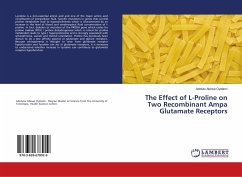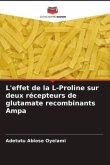L-proline is a non-essential amino acid and one of the major amino acid constituents of extracellular fluid. Specific mutations in genes that control proline metabolism lead to hyperprolinemia which is characterized by an increase in the level of blood and cerebrospinal fluid concentration of l-proline. In fact, deletion or mutation of the PRODH gene which codes for proline oxidase (POX) / proline dehydrogenase which is critical for proline metabolism leads to type I hyperprolinemia and is strongly associated with schizophrenia, autism and mental retardation. Proline has previously been shown to be a low affinity agonist at glutamate and glycine receptors. Because schizophrenia is thought to arise from glutamate receptor hypofunction and l-proline can act at glutamate receptors, it is necessary to understand whether increase in l-proline can contribute to glutamate receptor hypofunction.
Bitte wählen Sie Ihr Anliegen aus.
Rechnungen
Retourenschein anfordern
Bestellstatus
Storno








